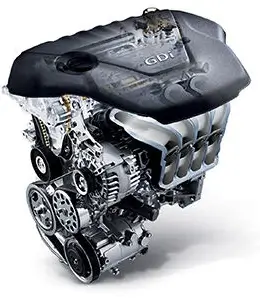Here’s why Hyundai and Kia engines fail
Hyundai and Kia engines fail due to poor manufacturing processes
Hyundai and Kia engines fail at an incredibly high rate. In fact, they’ve had to recall vehicles due to engine problems on the vehicles listed below. The engine problems come down to two issues: poor manufacturing that prematurely wears out the engine and engine fires.
Hyundai and Kia fail due to engine wear
During the engine machining process, Hyundai and Kia engines were not cleaned properly. The machining left metal shavings in the engine. Those shavings can eventually find their way into crankshaft oil passages, clogging them and causing oil starvation which results in premature and severe bearing wear. In some cases, the wear is so bad that the engines seize. In lesser cases, the vehicle stalls.
Which Hyundai engines and Kia engines have the problem
The machining issue affects the 2.0 and 2.4-liter engines with  gasoline direct injection or multi-point injection. These engines are part of the Theta/Theta-II family of engines.
gasoline direct injection or multi-point injection. These engines are part of the Theta/Theta-II family of engines.
Hyundai/Kia Class Action Lawsuit Settlement
On Oct 19, 2019 Hyundai and Kia announced a settlement to resolve a class-action lawsuit regarding vehicles equipped with the Theta engines.
Vehicles affected by the settlement
2.3 million Hyundai vehicles
2011-2019 Sonata
2013-2018 Santa Fe Sport
2019 Santa Fe,
2014-2015, 2018, and 2019 Tucson
1.8 million Kia vehicles
2011-2019 model year Sportage, Sorento and Optima vehicles with 2.0-liter and 2.4-liter GDI engines.
What you’re entitled to if your Hyundai or Kia engine fails
• Free inspection and repair of the covered engines,
• Cash reimbursement for certain past repairs and related expenses, such as towing and rental cars;
• Cash compensation for certain past trade-ins, sales, and in lieu of certain repairs;
• Lifetime warranty coverage for short block assembly repairs for original and subsequent owners;
• Free installation of the knock sensor detection system software update. The technology uses software innovations and leverages existing engine sensors to continuously monitor for symptoms that may precede an engine failure. It is installed free of charge for all vehicles in the settlement by Hyundai and Kia dealers.
The knock sensor detection system software continuously monitors engine vibrations for unusual dynamic patterns that develop as an engine connecting rod bearing wears abnormally in a way that could later cause engine seizure. If vibrations caused by bearing wear start to occur, the malfunction indicator lamp will blink continuously and the vehicle will be placed in a temporary engine protection mode with reduced power and acceleration. In this temporary mode, drivers maintain full control of the vehicle as brakes, steering, and safety devices such as airbags remain operational.
The vehicle can continue to be operated for a limited time in engine protection mode to enable the customer to safely drive it to a dealer for inspection and repair, but acceleration will be slower, with a reduced maximum speed of approximately 60 to 65 mph and a limited engine speed of approximately 1,800 to 2,000 rpm. The knock sensor technology has been evaluated by an independent, leading engineering and scientific consulting firm. When tested using a fleet of vehicles specifically prepared to test the knock sensor technology, the knock sensor system successfully detected failing connecting rod bearings and responded with activation of the engine protection mode.
• Various goodwill compensation for customers inconvenienced by previous lengthy engine repair times, denied warranty coverage, and vehicle loss of value, among other provisions
©, 2020 Rick Muscoplat
Posted on by Rick Muscoplat